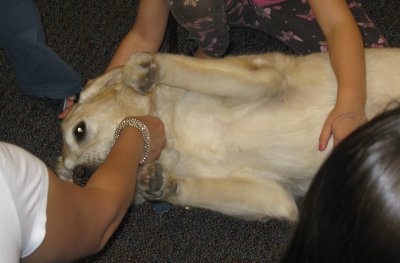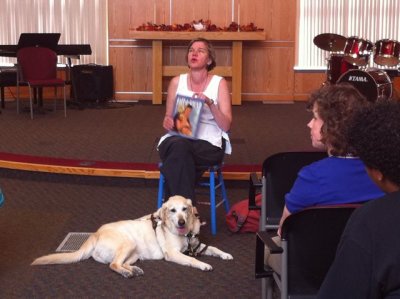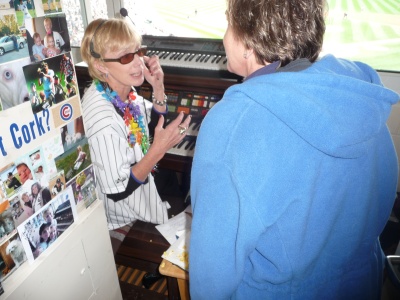Library love
October 15, 2010 • 11 Comments • Posted in blindness, Uncategorized, visiting libraries, writingSeems like Hanni and I had just returned home from that Youth Festival in Champaign when we found ourselves boarding a train again Monday morning. This time, our destination was Glencoe, IL. Librarian Melissa Henderson met us at the train station and led us to a local coffee shop for a snack before our morning presentation at the Glencoe Public Library. In between bites of cream cheese and lox on a bialy, I asked Melissa where she’d gone to library school.
“U of I,” she boasted. She had reason to be proud: the U.S. News and World Report ranks University of Illinois’ Graduate School of Library and Information Science (GSLIS) the top program in the nation. “I Was in their LEEP program,” she said. “I absolutely loved it!”
Melissa was amazed I knew what the “LEEP program” was. And she nearly fell off her chair when I told her I am friends with Sandy Wolf.
Back when we lived in Urbana, the University of Illinois Alumni Magazine asked me to write a story about LeEp, an online program at GSLIS that allows students far away to experience synchronous education — live sessions where the professors and students are on line at the same time, interacting with each other. Students are required to spend brief periods of time on the U of I campus taking course work, including a ten-day on-campus summer stay in Urbana that Melissa lovingly referred to as “boot camp.”
The wonderful Sandy Wolf is a librarian at GSLIS, and she was our next-door neighbor when we lived in Urbana. Sandy was a huge help to me with my magazine story about the library school. She connected me with all the right people, including a student named Jenny Schwartzberg. Jenny is deaf and uses a cochlear implant and a hearing aid to enhance both her hearing and her speaking skills. Wwhen I interviewed Jenny, she told me that taking coursework on line allowed her to work on her Masters and keep her day job as a Collection Development Assistant and Gift Specialist at the Newberry Library in Chicago. From my article:
Schwartzberg’s hearing impairment gave LEEP the opportunity to further develop technological delivery of the program. {Manager of Instructional Technology Jill} Gengler worked with LEEP colleagues and University of Illinois’ Disability Resources and Educational Services Division to provide captioning for lectures broadcast over Real Audio. “We provided a second screen for her with captions,” {Publicity and Communications Coordinator Kim}Schmidt said.
“It’s pretty technical, and it delivers the lectures to her in real time, you know, the same time the other students are listening.”
Melissa the Glencoe librarian gushed about the U of I program, and especially about my pal Sandy Wolf. . “I love Sandy! She’s the one who got me through graduate school, she’s the one who would find you the stuff no one else could. She’d even FedEx it to you sometimes, she was so, so good to me,” Melissa said, laughing as she remembered to add one more line. “Oh, And to all the other students, too!” Sandy has been working with GSLIS since 1984. It’s no wonder she received a Distinguished Service Award from the American Library Association last year.
The coincidences didn’t stop there. As Hanni and I were settling ourselves in to start our presentation, an energetic young woman came bounding up to introduce herself. It was Jocelyn Snower. She’s the woman I wrote about in the Chicago Tribuneafter her boss realized she was visually impaired and fired her. All our interviews had been online or over the phone, so this was the first time I met her in person. She lives in Glencoe, and she brought all four of her kids with her to hear me speak. “I hope they behave!” she laughed.
They did. Behave, I mean. It was a thrill to have the Snower family in the audience, along with so many other kids from Glencoe. My favorite question after our presentation this time came from a little girl in the front row. “So can you not see spiders?” she asked, almost in a whisper.
I told her no, I couldn’t. ”Are you afraid of spiders?” I asked, knowing full well what the answer would be.
”Yes!” she said.
”I am, too,” I confessed to her. “So really, it’s not such a bad thing, my not being able to see spiders anymore. I just pretend they aren’t there.”




